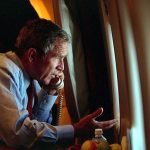
Trump’s Demand to Remove Colorado Portrait: A Threat to Free Speech and Artistic Expression
Posted in :
President Trump’s call to remove his ‘distorted’ portrait from the Colorado State Capitol raises concerns about free speech and artistic freedom in America.
Trump, Colorado, portrait controversy, free speech, artistic expression, censorship, Jared Polis, Sarah Boardman
In a recent display of sensitivity to artistic representation, President Donald Trump has demanded the removal of his portrait from the Colorado State Capitol, labeling it as “purposefully distorted” and “truly the worst.” This incident not only underscores Trump’s personal grievances but also raises significant concerns about his commitment to the principles of free speech and artistic expression.
The Portrait Controversy
The portrait in question, created by Colorado Springs artist Sarah Boardman, has been displayed in the Colorado State Capitol since 2019 alongside those of other U.S. presidents. Trump’s recent outburst on his social media platform, Truth Social, criticized the artwork for its alleged distortion and called upon Colorado Governor Jared Polis to remove it. Trump’s critique extended beyond the artist to the governor, whom he labeled a “Radical Left Governor,” accusing him of exacerbating crime issues in the state.
Artistic Interpretation and Presidential Sensitivity
Art, by its nature, is subjective and often reflects the artist’s interpretation rather than a photorealistic depiction. Boardman, known for her portrait of former President Barack Obama, which Trump praised as “wonderful,” has maintained that her political views did not influence her artistic work. This raises questions about Trump’s selective appreciation of art and his apparent inability to accept portrayals that do not align with his self-image.
Free Speech and Artistic Expression Under Threat
Trump’s demand for the removal of the portrait is emblematic of a broader pattern of behavior that threatens the foundational American values of free speech and artistic freedom. While the President has publicly championed free speech, his actions often contradict this stance. For instance, his administration’s interference in academic institutions, such as the pressure exerted on Columbia University to alter its policies or face funding cuts, demonstrates a troubling willingness to suppress dissenting voices and control narratives.
Hypocrisy in Championing Free Speech
The inconsistency between Trump’s proclaimed support for free speech and his actions is stark. In January 2025, he signed an executive order titled “Restoring Freedom of Speech and Ending Federal Censorship,” which ostensibly aimed to protect Americans’ constitutional rights. However, this order has been criticized as a veiled attempt to control and suppress opposing viewpoints, highlighting the administration’s selective application of free speech principles.
A Pattern of Censorship and Control
This incident in Colorado is not isolated. Trump’s administration has exhibited a consistent pattern of attempting to control artistic and academic expression. His self-appointment as chairman of the Kennedy Center’s board of trustees, followed by actions to remove performances he deems “anti-American,” illustrates a broader agenda to impose ideological conformity in cultural institutions.
The Chilling Effect on Artistic Communities
Artists and cultural institutions are increasingly finding themselves under scrutiny and pressure to conform to a particular narrative. The fear of retribution or loss of funding can lead to self-censorship, stifling creativity and the robust exchange of ideas that are vital to a thriving democracy. Trump’s actions serve as a warning to artists: portray him unfavorably, and you may face public denouncement or calls for censorship.
Conclusion
President Trump’s demand to remove his portrait from the Colorado State Capitol is more than a personal grievance; it is a manifestation of a broader assault on free speech and artistic expression. By attempting to control how he is portrayed and silencing dissenting voices, Trump undermines the very freedoms that underpin American democracy. It is imperative that citizens and institutions remain vigilant and resist efforts to erode the rights that allow for diverse and critical perspectives in art and public discourse.

